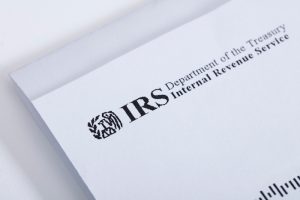
If you have tax debts, unfiled taxes, you’ve had an audit or you’re expecting one, you may have received a letter or notice from the IRS. Or maybe you’ve received a letter or notice from the IRS, and you want to make sure it’s authentic. The IRS communicates primarily through paper mail, and won’t send emails or text messages. Let’s take a look at some common IRS letters and notices you might have received, what each one means, and what your options are.
Common IRS Letters and Notices
1. IRS Notice CP2000
A CP2000 notice is a notification that the information that the IRS has about your income or payments doesn’t match up with what you’ve provided on your return. You might receive this notice a year after you’ve filed, as it takes some time for the IRS to match records. In some cases, this might simply be a clerical error, and you can and should contest a CP2000 notice if you think it’s not accurate.
2. IRS CP14 Notice
A CP14 notice is among the first notifications you’ll receive if you have unpaid taxes. If you did your taxes, realized that you owed tax, but didn’t pay it or didn’t pay it in full, you’ll probably receive a CP14 notice. This notice will also include penalties incurred from not paying on time. If you can’t pay this amount, there are options. At this point, it’s a good idea to contact a tax expert and make sure the amount is correct before moving forward.
3. IRS Notice CP504
A CP504 notice is notifying you that you have unpaid taxes, and that the IRS will seize your income tax refund to pay it if you don’t. This notice will be delivered via certified mail to the address you listed on your return, and it should state the amount owed. You should have received at least one previous notice about this amount, or it may have been mailed to an old address. If you think this is incorrect, you should contact a tax expert right away. If you don’t respond to a CP504 notice, the IRS will move forward with a lien or levy on your property or assets.
4. LT11 Notice of Intent to Levy
The LT11 Notice of Intent to Levy looks similar to a CP504 notice, but it is more serious. This notice is generally longer and includes a more detailed description of what you owe, what you can do, and what to expect. At this point, the IRS has probably sent other notices about your unpaid taxes. If you don’t respond to this notice, the IRS will continue to move forward with a levy, which can take money from your wages or bank accounts. If you dispute the taxes owed, you can schedule a hearing. However, you have a limited time to do so, so it’s vital to contact an expert immediately.
5. Final Notice of Intent to Levy
The Final Notice of Intent to Levy is a longer notice with more details about your situation and the next steps the IRS will follow. This notice will also include the amount you owe, including interest and penalties that have stacked up. You’ll also notice the option to request an appeals hearing and due dates to deliver this request. Once again, it’s essential to respond to this notice as soon as possible and work with a tax expert. Ignoring this notice will not make it go away.
6. IRS Notice CP15B
The IRS will send a CP15B notice to employers or responsible parties who have not paid employment taxes. When businesses take on employees, they are responsible for a number of employment taxes. The language on this notice can be confusing, since it refers to a trust fund. This refers to the trust fund in which employers hold these funds until they make federal tax payments. If you haven’t paid these, paid them late, or paid them inaccurately, the CP15B notice will inform you of what you owe, as well as penalties and interest. It is vital to address this notice right away, even if you currently can’t pay the amount.
7. IRS Letter 566
This correspondence audit letter is a request for more information. This does not necessarily mean that you will owe more taxes or that you have tax penalties. The IRS will request additional documents that prove that you are allowed to take a particular exemption, adjustment or credit. If you’re not sure what is required or you suspect you may have filled out your return incorrectly, get in touch with an expert.
8. IRS Letter 2205
Like the previous audit letter, letter 2205 is a request for more information. However, this letter is more in-depth and specific. You may see specific items that the IRS needs more information about. You’ll see contact information for an IRS agent, as well as information about representation. These letters often result in detailed audits and a tax expert can represent you properly. If you receive this letter, make an appointment with a tax expert first, so you know what to expect.
If you receive any of these common IRS letters and notices, know that you have options. The IRS can make clerical errors, so you do not necessarily owe the amount stated. Or, if the amount is correct, but you can’t pay it, know that you have options. If you think that the amount owed isn’t accurate, an expert can help. Call 877-922-7569 to schedule a free consultation today and learn more.

